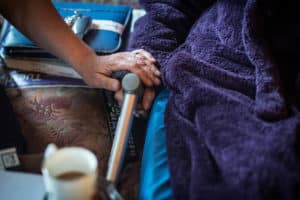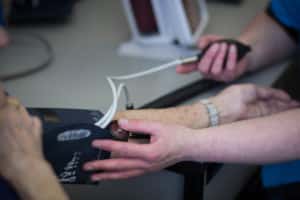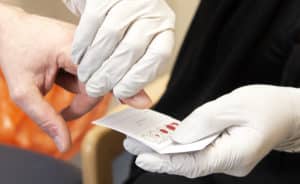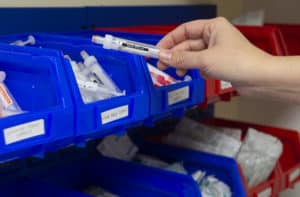By Dr Jonathan Sher, QNIS Deputy Director
April 7th marked World Health Day and the World Health Organisation (WHO) launched its long-anticipated State of the World’s Nursing report. The report describes how the nursing workforce can help deliver Universal Health Coverage (UHC) and the Sustainable Development Goals (SDGs).
The COVID-19 crisis in Scotland, the rest of the UK and around the globe has made visible how much all of us depend upon nurses to be there for us before, during and after our darkest days. The reality that all kinds of nurses in all kinds of settings are ‘essential’ has never been more obvious.

While clapping for Scotland’s heroic health and care workers, the image in many minds would be of those working in acute hospitals with the people most critically ill from the new coronavirus. That’s who we see and hear daily now on the news, just as they are the ones featured over the years in so many hospital-based television programmes and films. It is absolutely right to applaud them – and even more important to support them by doing our part to help slow this pandemic. That means staying at home, social distancing and handwashing.
However, there is a different image of heroic health professionals in my mind. It is of Scotland’s large and incredibly diverse workforce of nurses in the community. Since joining the staff of the Queen’s Nursing Institute Scotland (QNIS) eighteen months ago, it has been my pleasure and privilege to work with a sample of the more than 10,000 community-based nurses who care for our wellbeing in every corner of the nation. They receive little fanfare or recognition for the continuous, crucial contributions they make to Scotland’s health.

Consider the fundamental importance of community nurses throughout the COVID-19 pandemic.
Before admission to an acute hospital, advanced nurse practitioners and specialist nurses are triaging patients at community COVID assessment centres. District nurses, community midwives, health visitors and community mental health nurses continue to visit people in their homes with their social care colleagues. They are routinely exposed to people who may have this illness and are contagious – but not yet symptomatic. Community nurses play a major public health role by being known and trusted health professionals who explain and reinforce broad prevention messages. They also help ensure that the most vulnerable among us are still cared about, and cared for, even while being ‘shielded’.
During this pandemic, nursing care in Scotland’s communities is being prioritised for those who are most at risk during this period; new mothers still need visiting, children still need safeguarding, those experiencing a mental health crisis still need support and the frail elderly still need ongoing care. No one’s existing needs magically disappeared, and new ones didn’t stop appearing, just because this pandemic became Scotland’s and the world’s top priority.
 Indeed, some problems will predictably become worse during lockdown. Most people with COVID-19 will be cared for at home, or a homely setting, by family and/or care staff and, happily, most of them will recover. But many people will require end of life care, either in their own home or a care home. This is the expertise of district nursing teams and care home nursing teams. They have the professional knowledge and skill to support people and their loved ones and carers through a dignified end of life journey.
Indeed, some problems will predictably become worse during lockdown. Most people with COVID-19 will be cared for at home, or a homely setting, by family and/or care staff and, happily, most of them will recover. But many people will require end of life care, either in their own home or a care home. This is the expertise of district nursing teams and care home nursing teams. They have the professional knowledge and skill to support people and their loved ones and carers through a dignified end of life journey.
Additional demands created by COVID-19 only exacerbate the current caseloads, stresses and strains upon nurses in the community as hospitals seek to discharge people rapidly. And yet, unless necessary self-isolation prevents it, Scotland’s community nurses still show up every day and shoulder these extra burdens upon them with competence, kindness and compassion.
After COVID-19 passes, the roles and importance of Scotland’s community nurses will not diminish. All the important routine care will need to be reinstated rapidly, as will catching up on missed assessments and delayed treatments. At a population level, the post-pandemic period will predictably result in the release of pent-up demand for community health care services that have been paused or curtailed during the crisis. The public health and prevention roles of community nurses will remain central because there is the all-too-real risk of a second wave of COVID-19. This risk will be with us until an effective vaccine has been found and a vast majority of the population has been immunised.
 Meanwhile, among its many other coronavirus initiatives, the Scottish Government is preparing National Clinical Guidance for Nursing and AHP Community Health Staff during the COVID-19 Pandemic. This sets out the priorities for protecting staff, coordinating care between professionals and ensuring that the needs of all Scotland’s citizens are considered by deploying nursing and AHP (Allied Health Professionals) expertise most effectively.
Meanwhile, among its many other coronavirus initiatives, the Scottish Government is preparing National Clinical Guidance for Nursing and AHP Community Health Staff during the COVID-19 Pandemic. This sets out the priorities for protecting staff, coordinating care between professionals and ensuring that the needs of all Scotland’s citizens are considered by deploying nursing and AHP (Allied Health Professionals) expertise most effectively.
Long before this pandemic, the World Health Organisation (WHO) named 2020 as the International Year of the Nurse and Midwife. That is an even more timely and important celebration than WHO might have realised. Scotland’s people and organisations should support nurses in whatever practical, meaningful ways we can (no matter how small), so they can continue to protect, care for and support all of us.
This article was first published in The Herald on April 7 2020.
Leave a Reply